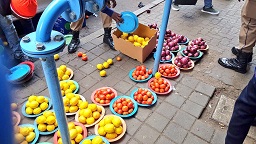
Scenes of Joburg Metro Police Department’s officers confiscating unregistered hawkers’ goods on the streets of the city will soon be a thing of the past.
It follows the recent approval of the new Informal Trading Policy by City of Johannesburg’s Council. The policy aims to make doing business in the City of Johannesburg “easier and better”.
Mmatshepo Chiloane-Oganne, Deputy Director: Communications and Stakeholder Management, Office of MMC for Economic Development, says the Informal Trading Policy was approved by Council on Tuesday, 26 April 2022.
The policy has been in the making since 2018. The approval of the policy by Council will also trigger the process of reviewing the demarcation map, which will inform clearly marked stalls and spaces for traders to legally trade from. It will also ensure transparency in the allocation of stalls, which will safeguard the “one stall, one trader” policy and avert the unauthorised sub-letting of stalls across the City.
The Member of the Mayoral Committee for Economic Development in the City of Johannesburg, Cllr Nkuli Mbundu, says: “This is a victory for the informal traders of the city as it will ensure a level of organisation for the sector.
“This document might be an official City policy, however, all stakeholders can feel a sense of ownership as they largely were the driving forces in the development of this all-encompassing document. We are pleased that we could close this chapter.”
This highlight finally paves the way for an organised trade sector within the City. The policy is the basis for the Informal Trading Permit System. The reviewed permit system boasts several benefits for informal traders, and it is anticipated the permit system will be fully implemented later this year.
“It will help in organising and structuring the different regions, especially starting with the inner City. The policy speaks to creating structures,” Chiloane-Oganne explains.
She says in the past, attaining a permit was a difficulty and traders would have questions like where to go and what to do. The new policy answers those questions and creates convenience for traders.
“The purpose of the new Informal Trading Policy is to have regulations in place that guide the City around informal trading. For the Department of Economic Development, organising the inner city allows us to create a business enabling environment,” she adds.
She says cleaning up the inner city means it’s easier to attract investments to the city.
Other benefits for informal traders include working in a well-governed and monitored system accommodating their needs. During engagement sessions, traders raised the issue of not having proper sanitation facilities, and this will now be provided. Traders will be able to grow their businesses because their environment allows them to do so.
The new policy also provides an opportunity for informal traders to be represented in decision-making processes across various City structures through the Informal Trading Stakeholder Committee. It also provides for an effective and streamlined application process that will use the latest technology, which is in line with the Multi-Party Government’s Mayoral priority of a Smart City.
Informal traders who would like to find out more can email Economic Development Department at mmc.ed@joburg.org.za
INFO SUPPLIED

